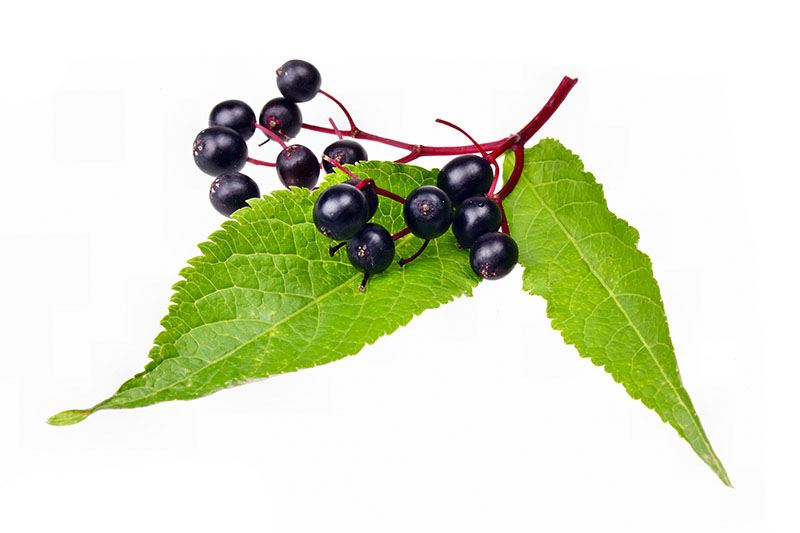What is Elderberry?
Elderberry refers to the fruit of the elder tree, primarily the species Sambucus nigra, commonly known as the European elderberry or black elder. This small, dark purple berry grows in clusters on the elder tree, which is native to Europe but has spread to various parts of the world, including North America. Elderberry has been used for centuries in traditional medicine, culinary arts, and even in the creation of dyes.
The elder tree itself is a deciduous shrub that can grow up to 30 feet tall. It is easily identifiable by its serrated leaves, creamy-white flowers, and clusters of small, dark berries. The flowers, known as elderflowers, also hold medicinal properties and are often used in teas, syrups, and cosmetics. However, the berries are the most commonly used part of the plant, known for their potential health benefits and rich nutritional profile.
Elderberry Benefits
Elderberries are renowned for their impressive health benefits, largely attributed to their high content of vitamins, antioxidants, and bioflavonoids. One of the most significant advantages of elderberries is their ability to boost the immune system. They are rich in vitamin C, which is crucial for immune function, and anthocyanins, which have been shown to enhance the body’s immune response. Regular consumption of elderberries can help reduce the duration and severity of colds and flu.
Moreover, elderberries have anti-inflammatory properties. The antioxidants present in these berries help combat oxidative stress, reducing inflammation throughout the body. This is particularly beneficial for individuals with chronic inflammatory conditions such as arthritis.
Elderberries also support heart health. They contain high levels of potassium, which helps regulate blood pressure, and dietary fiber, which aids in cholesterol management. Combining these nutrients can contribute to a healthier cardiovascular system and reduce the risk of heart disease.
Additionally, elderberries have been linked to improved skin health. The antioxidants and vitamin A in elderberries help maintain skin elasticity, combat signs of aging, and protect against sun damage. They are also used in various skincare products for their soothing and healing properties.
What Forms Does Elderberry Come In?
Elderberry is incredibly versatile and comes in various forms, making it easy to incorporate into your daily routine. One of the most popular forms is elderberry syrup. This syrup is made by cooking the berries with water and sweeteners such as honey or sugar. Elderberry syrup is often taken by the spoonful as a preventative measure against colds and flu or added to drinks and recipes for a health boost.
Gummies
Elderberry gummies are another popular form, especially among children. These gummies are typically made with elderberry extract and other natural ingredients to create a tasty and convenient supplement.
Tablets / Capsules
Elderberry capsules and tablets offer a straightforward way to benefit from elderberry’s properties without any preparation. These supplements are usually made from dried elderberry powder or extract and can be taken daily with water.
Dried Elderberries
Dried elderberries are available for those who prefer a more natural approach. They can be used to make teas and syrups or even added to baked goods and cereals.
Tea
Elderberry tea, made from dried berries or flowers, is a soothing and nutritious beverage many enjoy.
Liquids / Concentrates / Extracts
Elderberry tinctures are another option. These concentrated liquid extracts are made by soaking elderberries in alcohol or glycerin, capturing the berry’s beneficial compounds in a potent form. A few drops of elderberry tincture can be added to water, juice, or directly.
Historical Uses of Elderberry
Elderberry has a rich history dating back to ancient times. It has been used by various cultures for its medicinal properties, culinary uses, and even folklore and traditions. The ancient Egyptians used elderberries to improve their complexions and heal burns. Traditional European medicine also used elderberries and elderflowers to remedy various ailments.
In medieval Europe, elderberries were considered holy trees capable of warding off evil spirits and bringing good luck. It was common to plant elder trees near homes for protection. The berries made wines, jams, and syrups, while the flowers were often infused into teas and cordials.
Native American tribes also valued elderberries, using them to treat infections, improve respiratory health, and as a diuretic. They utilized all plant parts, including the bark and leaves, for various medicinal purposes.
In traditional Chinese medicine, elderberry was used to treat rheumatism and traumatic injuries. It was believed to promote longevity and maintain overall health.
A Popular Supplement
Elderberry, with its rich history and extensive health benefits, continues to be a valuable resource in both traditional and modern medicine. Its immune-boosting properties, anti-inflammatory effects, and support for heart and skin health make it a popular choice for those seeking natural remedies. Available in various forms such as syrups, gummies, capsules, and teas, elderberry is easy to incorporate into daily life. Whether consumed as a preventative measure or a treatment, elderberry remains a powerful ally in promoting overall health and well-being. As research continues to uncover more about its potential, elderberry’s reputation as a versatile and beneficial plant is sure to grow even further.


Use Coupon Code: FREE
*Sorry, coupons can't be combined.